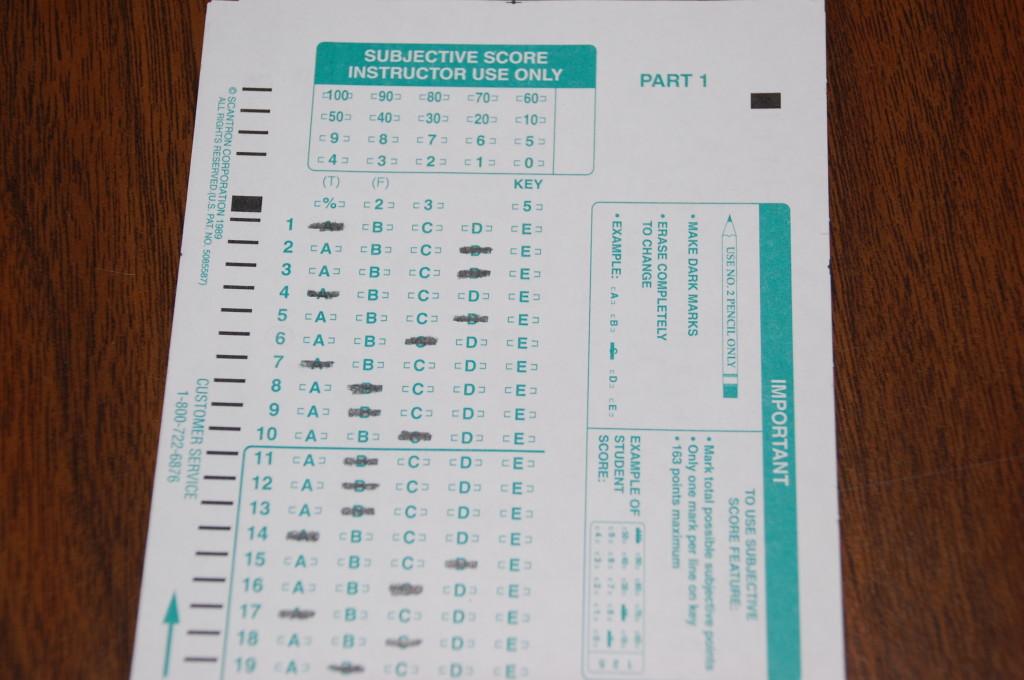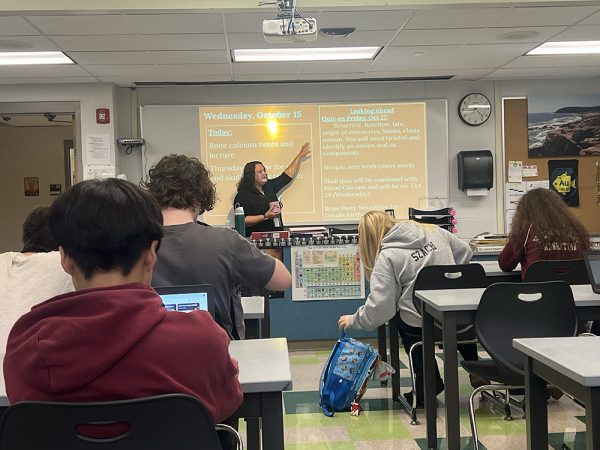Once Again, Students and Teachers Brace For New State Tests
Next week all freshmen and sophomores as well as some juniors and seniors will take the Ohio’s end-of-course exams produced by the American Institutes for Research (AIR).
The tests will cover Language Arts 1 & 2, Algebra 1, Geometry, Biology, Physical Science, American History and American Government.
“The AIR Assessments allow us to measure the effectiveness of our curriculum in specific subjects,” Principal Dr. Ed Klein said. “Analyzing the curriculum, the tests and the results encourages us, as professionals, to refine how we instruct all of our students.”
On the other hand, many BHS students and teachers are skeptical about the value of these assessments in measuring the quality of our educational programs.
“They don’t capture a lot of the wonderful things that are happening in our classrooms: creativity, innovation, problem solving, community building,” science teacher Lisa Bugenske said. “Everyone should take a step back and proceed with caution when evaluating test scores, especially for these new assessments.”
These are, after all, the third tests in three years for Ohio English and math teachers. These state tests are part of a long process of education reform that was dramatically accelerated with the No Child Left Behind Act in 2002 and continues to evolve with new reforms from federal and state agencies every few years.
In March 2005, the Ohio Graduation Test was first issued as a practice exam for the Class of 2005 and a graduation requirement for the Class of 2006. The tests included sections on Reading, Writing, Mathematics, Science and Social Studies.
Ohio high school students were mandated to pass all five tests to be eligible to graduate. Many Beachwood students viewed the OGT as too easy.
“The OGTs were too simple, especially for Beachwood students. Most of us have AP and Honors classes to worry about, so it was kind of a waste of time,” senior Jessica Tall said.
During the 2015-16 school year, the Ohio Department of Education began to phase out the OGTs, and students who began high school as of July 1, 2014 or later are no longer required to pass the OGTs in order to graduate.
In spring 2015, Ohio used tests from the Partnership for Assessment of Readiness for College and Careers Test (PARCC) in math and language arts, and used AIR Assessments assessments in social studies and science. Due to widespread criticism, the PARCC tests were scrapped after one year and AIR assessments are now being used in all core subject areas.
As of Spring 2016, the Classes of 2018 and 2019 will have to take the AIR Assessments as a graduation requirement. Instead of five main subject tests, students will take assessments according to the specific classes in which they are enrolled. For example, instead of taking a general ninth grade science test, freshman biology students will take a biology-specific test.
The students will receive a certain number of graduation points for each test they pass.
“In general, students graduating in 2018 or later need 18 points to graduate, including a minimum of 4 points in English, 4 points in math, and 6 points in science and social studies,” guidance counselor Meghann Sullivan explained. “The remaining 4 points can come from any of these subjects.”
English teacher Casey Matthews said she looks forward to seeing the yearly progress of her ninth grade students with the new AIR tests.
“The OGT was for the 10th grade only, so by the time the students were tested by the OGT, it became very interesting to see what they got from me in 9th grade and what they got [from other teachers] … in the 10th grade,” Matthews said.
“This is a different test that measures a different curriculum than the OGTs measured,” Principal Dr. Ed Klein said. “I believe that the administration of the AIR Assessments is more efficient than the administration of the PARCC assessments, though both of those assessments were measuring the same [Common Core] curriculum.”
English teacher Todd Butler’s sophomore English students are required to take the AIR Assessments this year. Butler said he hopes the new tests will be able to better assess students’ learning progress.
However, in a general sense, he expressed concerns about standardized tests.
“I believe that the human being is too complex to be assessed in a standardized way,” he said.
Of standardized tests, Klein noted, “No test can be perfect.”
While many students and teachers are skeptical of the tests, BHS teachers are expected to prepare their students for standardized tests regardless of personal opinion.
“My expectation, as the principal, is that teachers within their respective departments have examined their curricula and courses of study to ensure alignment with the requisite standards,” Klein said. “Additionally, I expect that teachers of tested subjects are practicing the skills and knowledge for the respective exams.”
In most classes, test preparation is integrated into classes throughout the school year.
“I look at how to design questions for the ninth graders throughout the year,” Matthews said. “When I teach [Jon Krakauer’s] Into Thin Air, a lot of the formats I use for my quizzes are similar questions to the way they have it formatted for these tests.”
Butler and other teachers have had to adjust their curriculum in order to suit the new assessments.
“The biggest change has come in spending more time on content to attempt to achieve mastery. This has cut into curriculum and has forced many teachers to slow down the pace,” Butler said.
“This is a new test and I’m not sure how to adjust [my curriculum] to it yet,” Matthews added.
“In order to prepare students, we’ve been doing much more design and analysis of experiments,” science teacher Bugenske said.
“I think the department has done a great job balancing the amount and depth of content with application of concepts and test practice,” she continued.
The concept of standardized tests isn’t the only concern surrounding the AIR Assessments. Matthews said she also worries about the level of test content for her freshman Honors English class.
“I’ve looked at the released AIR practice test for ninth grade,” Matthews said. “It’s going to be some type of comparative thing [where two pieces of literature are compared] which is what we talk about in class with The Once And Future King. But the released test items covered Transcendentalism: Thoreau and Emerson, which are not 9th grade material.”
Transcendentalist writers such as Ralph Waldo Emerson and Henry David Thoreau are part of the 11th grade American literature curriculum.
The Beachcomber asked a freshman honors English student to take the released Ohio AIR 9th Grade English practice assessment, and he struggled with the test.
Seniors Bennett Woomer and Spencer Millard attempted to take the test as well and also struggled with the questions.
“I learned this last year. It’s not fair to test the freshman on these topics,” Woomer said.
“Emerson and Thoreau are definitely too hard for freshman to be tested on,” Millard added.
The math assessments, however, are much more fair, in their opinion.
“I took geometry [as a] sophomore,” Millard said. “This test is definitely fair, as it covers the curriculum I learned.”

Samantha is a senior at BHS. She is a captain of the school’s speech team where she specializes in original oratory, but has also participated in duo...






![“My parents have always said that education is important. My parents are Chinese immigrants, I'm Chinese American, [and that's a] value that has always been ingrained in our community,” said Senior Lyndia Zheng, pictured with Tony Zheng](https://bcomber.org/wp-content/uploads/2025/10/DSC_4244-600x400.jpg)




